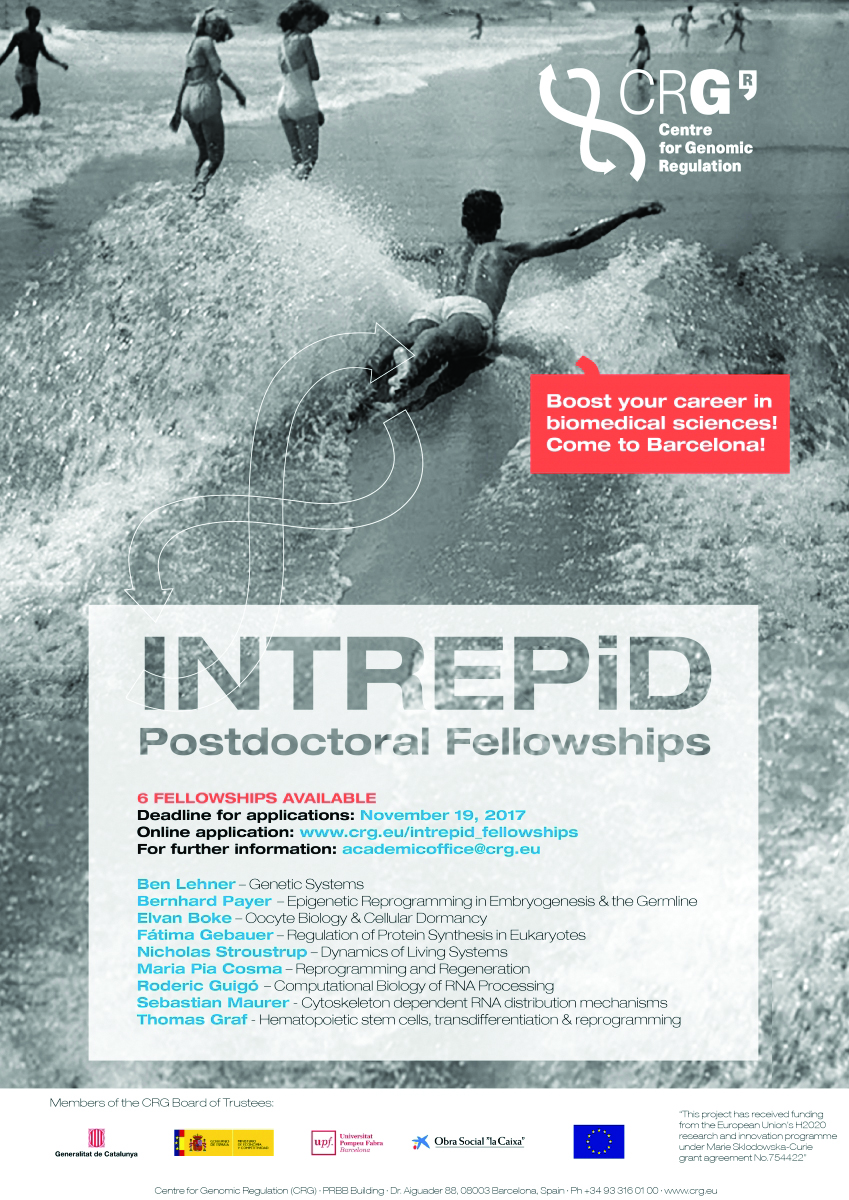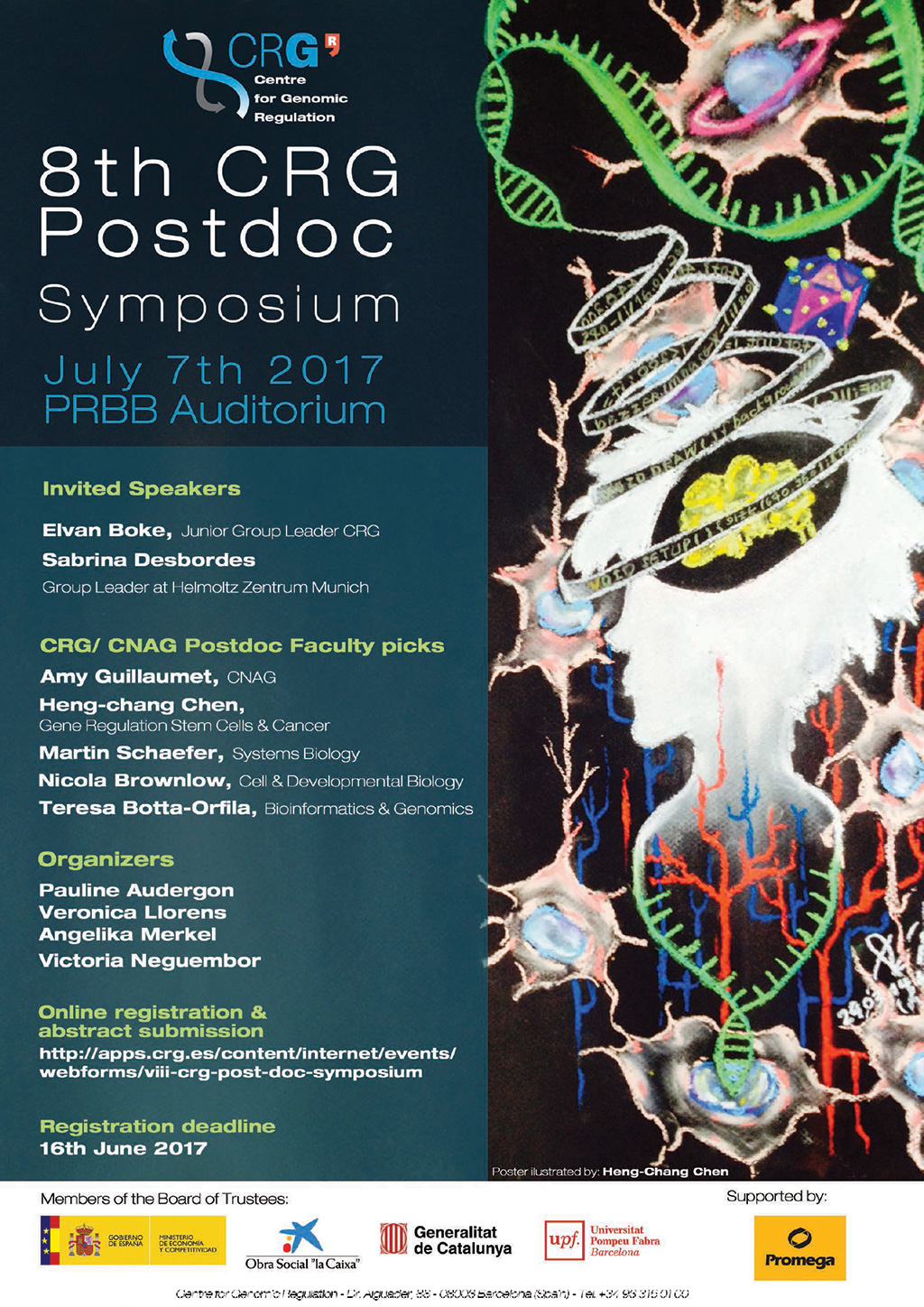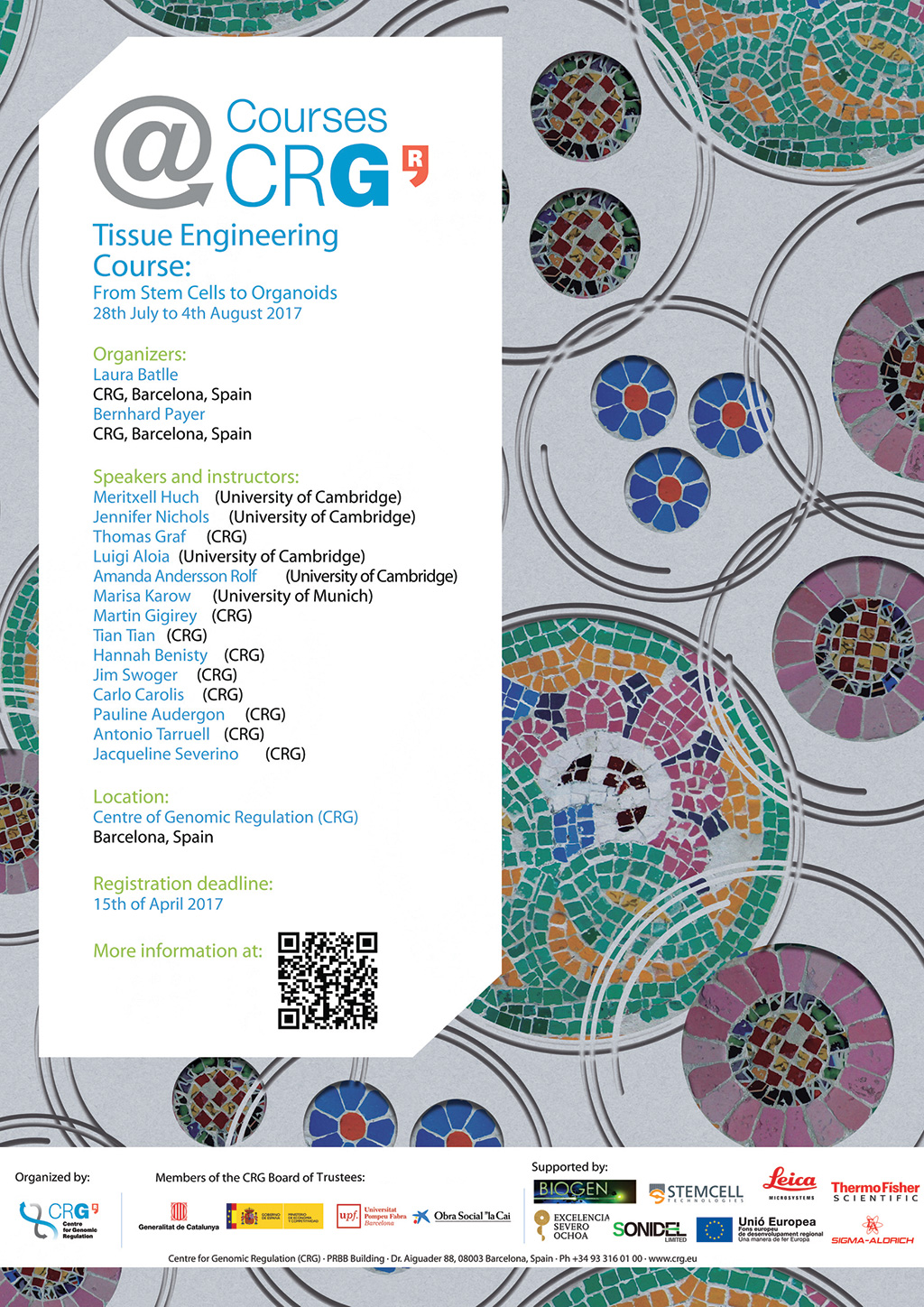Advanced training at different career stages lies at the core of the CRG’s activities. From Master and PhD students to postdoctoral fellows and junior group leaders, the CRG offers a stimulating and enriching environment, a comprehensive training programme and tailored courses on scientific and transferable skills.



Academic Programmes
The CRG International PhD Programme is the flagship of the CRG’s commitment to training, and is characterised by a combination of dedicated mentoring and scientific training to support early independence and creativity. The programme has been running for more than 10 years and has remained very attractive and competitive, receiving around 400 applications from over 50 different countries and admitting 20-30 students every year.
In 2017, the International PhD Programme continued to attract up-and-coming talent from all over the world through the support of internal and external competitive funds. In addition to the annual CRG PhD Call, and together with the IRB Barcelona, the VHIR and the IDIBAPS, we have been running a training programme on research for medical doctors for four years now, called the PhD4MD programme. The programme’s long-term goal is to train the next generation of physician-scientists who will drive research and bring about a greater impact on patients. A total of 4 MDs joined the CRG between 2014 and 2017.
The CRG Postdoc Programme enables young researchers to work on highly collaborative and interdisciplinary projects across different groups and units at the CRG. After two rounds of successful funding in 2009 (INTERPOD) and 2014 (ImPuLSe), the Postdoc Programme has been awarded a third grant from the EC through its Marie Skłodowska-Curie H2020 COFUND Actions for the 2017–2022 period (INTREPiD). The third COFUND Programme enables collaborations with other academic institutions and the industry, thus allowing postdocs to establish and maintain connections that will prove useful in building their careers beyond the CRG. Several research institutes, including the Institute Curie, the Research Institute of Vall d’Hebron (VHIR) and companies such as Novartis and Esteve, joined the INTREPiD Programme as external partners.
The INTREPiD programme includes a training curriculum targeting non-scientific researcher skills – for example, research ethics, outreach and gender in science – and offering dedicated career development support. The first call opened in September 2017, and 6 new fellows were selected.
Finally, the 5th edition of the International CRG Summer Internship Programme for undergraduate students was launched in February 2017: 5 internships were awarded to provide undergraduate students with the opportunity to conduct research at the CRG over the summer (countries of origin: Russia, Denmark, the Ukraine, Italy and the Czech Republic).
The CRG has also several active partnerships with Master programmes to host students for a research internship: UPF, UB, UPC, Faculty of Sciences of the Saint-Joseph University (Beirut), MIT (USA), etc. This year, we agreed to initiate a new alliance with the University of Richmond (USA) to host their Undergraduate students for a research-intensive internship over the summer next year. We will continue to explore other alliances to attract top junior researchers.
The CRG also contributed to the development of the new BIST Master of Multidisciplinary Research in Experimental Sciences launched last October 2017. Two students were awarded a fellowship to do Masters at the CRG. A new edition of the Masters is currently open.
Training Programme
In 2017, the CRG Advanced Training Programme was enhanced with several new high-level international courses within the framework of Courses@CRG, as well as a more extensive offering of internal scientific courses and workshops. As in previous years, the courses organised by the CRG were open to both local and international scientific communities and delivered high-quality training in the latest scientific breakthroughs and technologies.
In 2017, the CRG Training Unit co-organised and delivered seven high-quality Courses@CRG, one EMBO course and a joint course with FIMM, which were attended by 170 participants from research institutes in 34 different countries, including Argentina, Australia, Israel, Mauritius, Singapore, South Africa and the USA.
- Chromosomal conformation (F. Le Dily)
- Advanced Proteomics (E. Sabidó)
- Tissue Engineering: From stem cells to organoids (L. Batlle)
- Whole-Cell Modelling (L. Serrano, M. Lluch)
- Nextflow: Reproducible in silico genomics (P. Di Tommaso, C. Notredame)
- C. elegans: CRISPR, RNAi and Genetics (B. Lehner)
- CRISPR/Cas9: Genome Editing tool (C. Carolis, L. Di Croce)
- EMBO-Targeted proteomics: Experimental design and data analysis (E. Sabidó)
- Epigenetics in Clinical and Translational Research (L. Di Croce) in collaboration with FIMM and held in Helsinki
The Courses@CRG attracted sponsorship/partnership from Amazon, Bio-Cat, Biogen, IDT, Izasa Scientific, Leica, Nema Metrix, Nikon, Sigma Aldrich, Sonidel, Stem Cell Technologies and Termo Fisher.
A key highlight in 2017 was the development of a rich portfolio of internal courses focusing on scientific and technology skills and transferable skills, research integrity and career coaching. Internal training has opened up new opportunities for trainers and trainees alike. Technicians, PhD students and Post-doctoral researchers gained experience in teaching and sharing their knowledge and expertise with the rest of the CRG community, while participants benefited from the wide range of training activities offered throughout the year (see below). The 23 workshops straddled all levels of scientific careers, from undergraduate students to group leaders, and were attended by some 450 participants from all CRG and CNAG-CRG programmes and fields.
Eleven Scientific & Technical workshops: Linux, Cluster, Bioinformatics, programming in Python and R, Software in the cluster) were attended by almost 150 CRG and CNAG-CRG attendees.
In 2017, Electronic Lab Book (ELN) training was implemented for all 1st year PhD students at the institute as well as a Research integrity and Open Science starter course.
Since May 2017, an online Research Integrity course has been mandatory for all new-comers at the CRG. It consists of interactive modules, quizzes and short video tutorials on ethics and research integrity.
Almost 300 CRG and CNAG-CRG students, post-docs, technicians and PIs attended 12 courses strengthening their skills in science communication, management, leadership and entrepreneurship.
Learning by doing is an initiative to enable CRG researchers to do an internship in different management departments of the CRG in order to glean practical experience in managing scientific projects, science communication and in organizing events and trainings for scientists, high school teachers and a general audience. We recruited 10 researchers in the following departments: ISA, Communication and Grants.
PhD Theses defended in 2017
| Name | Supervisor | Date | University | Thesis Project |
| Shalu Jhanwar | Stephan Ossowski | 11-01-17 | UPF | Computational Analysis of Epigenomic Variability and its Effect on Regulatory Activity |
| Pablo Prieto | Cedric Notredame | 12-01-17 | UPF | NGS applications in genome evolution and adaptation |
| Gireesh Kumar Bogu | R.Guigó/M.Martí-Renom | 13-01-17 | UPF | Understanding the transcriptional landscape of non-coding genome in mammals |
| Anghugali Aheto Sumi | Jerome Solon | 13-01-17 | UPF | On contractile actomyosin waves and their role in junctional remodelling during epithelial constriction |
| Ibrahim Tastekin | Matthieu Louis | 16-01-17 | UPF | The structure-function relationships underlying Drosophila larval chemotaxis |
| Francesco Sottile | Pia Cosma | 18-01-17 | UPF | Mesenchymal stem cells generate distinct functional hybrids via cell fusion or entosis |
| Avinash Khandelwal | Matthieu Louis | 19-01-17 | UPF | The wiring diagram of antennal lobe and mapping a brain circuit that controls chemotaxis behavior in the Drosophila larva |
| Joao Frade | Pia Cosma | 20-01-17 | UPF | Ploidy reduction determines the fate of reprogrammed cell fusion hybrids |
| Ilda Theka | Pia Cosma | 06-02-17 | UPF | Wnt/β-catenin activity controls the stability of imprinted genes in mouse embryonic stem cells |
| Michael Maier | Manuel Mendoza | 30-03-17 | UPF | Origin of chromatin anaphase bridges |
| Luisa de Andrés Aguayo | Thomas Graf | 05-05-17 | UPF | The role of Msi2 in adult and embryonic hematopoiesis |
| Birgit Ritschka | Bill Keyes | 15-09-17 | UPF | Investigating senescence in cellular plasticity and tissue regeneration |
| Marta Fructuoso | Mara Dierssen | 18-09-17 | UPF | Understanding the mechanisms of food intake and obesity in Down syndrome is supported by behavioral and neurochemical abnormalities |
| Ernst Thuer | Toni Gabaldón | 22-09-17 | UPF | Deep sequencing approaches to investigate the dynamics and evolution of interaction networks of Candida pathogens and the human host. |
| Ajinkya Deogade | Matthieu Louis | 23-11-17 | UPF | Fine-grained Model of the Sensorimotor Control Underlying Drosophila Larval Chemotaxis |
| Elie Fink | Matthieu Louis | 23-11-17 | UPF | Diversity of chemosensory behaviour in the drosophila genus |
| Hana Susak | Stephan Ossowski | 05-12-17 | UPF | The hunt for cancer genes |
| Hima Priyanka | Fátima Gebauer | 11-12-17 | UPF | Insights into cytoplasmic polyadenylation mediated by Drosophila Dicer-2 |
| Andrea Battola | Manuel Mendoza | 12-12-17 | UPF | Distinct roles of polarity factors Boi1 and Boi2 in the control of exocytosis and abscission |
| Pol Cuscó | Guillaume Filion | 13-12-17 | UPF | Machine learning approach to the study of chromatin |
| Carla Bello | Fyodor Kondrashov | 15-12-17 | UPF | Evolution of the non-coding genome |
| Joan Pallarès | Eulàlia Martí | 14-12-17 | UPF | Evaluation of non-coding RNAs in Parkinson’s disease |
| Miquel Rosas | Isabelle Vernos | 19-12-17 | UPF | Understanding RanGTP dependent microtubule assembly; Identification of DnaJB6 as a RanGTP regulated factor involved in microtubule organization during mitosis |